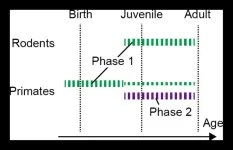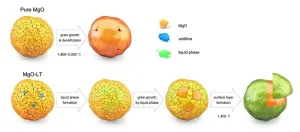A healthy gut plays an indispensable role in the absorption and metabolism of nutrients, maintaining immune function, and promoting general well-being. The profound impact of a healthy microbiome is not just limited to the gut, but there is mounting evidence that it influences almost every function of the body. Thus, the composition of the gut microbiome becomes an important indicator of health status of the body.
Probiotics are a type of supplements containing live strains of bacteria that improve and diversify the gut microbiome population. Lactiplantibacillus plantarum, a type of microorganism picked up from pickled vegetables, is known to be the most efficient probiotic and has been associated with varied health benefits. On the other hand, prebiotics are non-digestible dietary fibers that act as a source of nourishment for the gut microbiome and prebiotic strains. For instance, 1-kestose, a type of fructooligosaccharide (FOS) containing sucrose and fructose, is one of the most effective prebiotics. Additionally, paraprobiotics refers to non-viable or heat-killed microbial cells and are easier to store and manufacture, as compared to probiotics. The combination of probiotics and prebiotics is termed as “synbiotics,” whereas a combination of prebiotics with paraprobiotics is called “parasynbiotics.”
Just like humans, a healthy gut microbiome is vital for the care and general welfare of animals. For example, Clostridium perfringens, a spore-forming bacteria, is one of the most common causes of morbidity and mortality in birds. The plc gene of the bacteria is responsible for secreting alpha-toxin, which, at higher levels, can be life-threatening for birds, including captive penguins. Now, while studies on the impact of probiotics and prebiotics have advanced, the impact of synbiotics and parasynbiotics on the gut health of zoo birds, specifically penguins, remain unexplored.
Advancing research on this front, Professor Takumi Tochio and Dr. Tadashi Fujii from the Department of Medical Research on Prebiotics and Probiotics, Fujita Health University, Aichi, Japan, along with their colleagues recently attempted to fill this knowledge gap. They investigated the effect of prebiotic 1-kestose and paraprobiotic Lactiplantibacillus plantarum FM8 on the gut microbiome of Magellanic penguins (Spheniscus magellanicus). Their study was published in Volume 86, Issue 2 of Journal of Veterinary Medical Science, on February 8, 2024.
Sharing their inspiration behind the study, Prof. Tochio explains, “Although there are no reports on the intestinal microbiota of Magellanic penguins, it is conceivable that a parasynbiotic-intervention could improve their intestinal environment and provide various health benefits. Therefore, we aimed to investigate the effects of including a parasynbiotic combination in their feed, on the gut microbiome and overall health.”
To this end, the researchers administered parasynbiotics for 8 weeks to eight penguins aged below 3 years, referred to as the ‘Young-group’ and nine penguins aged above 17 years referred to as the ‘Adult-group.’ To analyze the impact of the parasynbiotics on the birds, genomic DNA was extracted from their feces.
16S rRNA sequencing revealed that parasynbiotic administration significantly decreased the intestinal population of the harmful Clostridiaceae_222000 in both groups. Moreover, the population of Lactobacillaceae in the Young-group significantly improved. Quantitative real-time polymerase chain reaction revealed a noteworthy decrease in the plc gene levels of C. perfringens in the Young-group.
Furthermore, plasma analyses revealed that the daily administration of parasynbiotics significantly decreased the alpha-globulin levels in the Young-group. Elevated levels of alpha-globulins often indicate inflammation, infection, and trauma. Interestingly, they also found that L. plantarum FM8 induced dendritic cells to secrete elevated levels of IL-10, an anti-inflammatory cytokine. These findings thus suggest that parasynbiotics can modulate and reduce inflammatory responses in penguins.
In summary, the study provides novel insights into the gut microflora and its modulation by parasynbiotics. Concluding optimistically, Prof. Tochio says, “Our findings that parasynbiotics have health benefits, particularly for young penguins, offer potential new strategies for maintaining animal health. With further research, these parasynbiotics may serve as tools to mitigate gut inflammatory responses and contribute to overall animal well-being.”
***
Reference
DOI: https://doi.org/10.1292/jvms.23-0238
About Fujita Health University
Fujita Health University is a private university situated in Toyoake, Aichi, Japan. It was founded in 1964 and houses one of the largest teaching university hospitals in Japan in terms of the number of beds. With over 900 faculty members, the university is committed to providing various academic opportunities to students internationally. Fujita Health University has been ranked eighth among all universities and second among all private universities in Japan in the 2020 Times Higher Education (THE) World University Rankings. THE University Impact Rankings 2019 visualized university initiatives for sustainable development goals (SDGs). For the “good health and well-being” SDG, Fujita Health University was ranked second among all universities and number one among private universities in Japan. The university became the first Japanese university to host the "THE Asia Universities Summit" in June 2021. The university’s founding philosophy is “Our creativity for the people (DOKUSOU-ICHIRI),” which reflects the belief that, as with the university’s alumni and alumnae, current students also unlock their future by leveraging their creativity.
Website: https://www.fujita-hu.ac.jp/en/index.html
About Professor Tochio Takumi from Fujita Health University
Dr. Tochio Takumi is a Professor at the Department of Medical Research on Prebiotics and Probiotics, and is also associated with the Department of Gastroenterology and Hepatology at Fujita Health University, Aichi, Japan, and BIOSIS Lab. Co., Ltd. Prof. Takumi’s research primarily focuses on the effects of probiotics and prebiotics on animal health and well-being, and significantly contributes to achieving UN Sustainable Development Goal pertaining to “Good Health and Well-Being.” Prof. Takumi has authored over 60 publications and has an impressive h-index.
END






